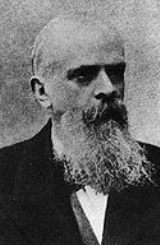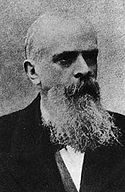
Graziadio Isaia Ascoli
Encyclopedia

Italy
Italy , officially the Italian Republic languages]] under the European Charter for Regional or Minority Languages. In each of these, Italy's official name is as follows:;;;;;;;;), is a unitary parliamentary republic in South-Central Europe. To the north it borders France, Switzerland, Austria and...
linguist.
Life and work
Ascoli was born in an ItalianItalian language
Italian is a Romance language spoken mainly in Europe: Italy, Switzerland, San Marino, Vatican City, by minorities in Malta, Monaco, Croatia, Slovenia, France, Libya, Eritrea, and Somalia, and by immigrant communities in the Americas and Australia...
-speaking Jewish
Jews
The Jews , also known as the Jewish people, are a nation and ethnoreligious group originating in the Israelites or Hebrews of the Ancient Near East. The Jewish ethnicity, nationality, and religion are strongly interrelated, as Judaism is the traditional faith of the Jewish nation...
family in the multiethnic town of Gorizia
Gorizia
Gorizia is a town and comune in northeastern Italy, in the autonomous region of Friuli Venezia Giulia. It is located at the foot of the Julian Alps, bordering Slovenia. It is the capital of the Province of Gorizia, and it is a local center of tourism, industry, and commerce. Since 1947, a twin...
, then part of the Austrian Empire
Austrian Empire
The Austrian Empire was a modern era successor empire, which was centered on what is today's Austria and which officially lasted from 1804 to 1867. It was followed by the Empire of Austria-Hungary, whose proclamation was a diplomatic move that elevated Hungary's status within the Austrian Empire...
(now in Italy
Italy
Italy , officially the Italian Republic languages]] under the European Charter for Regional or Minority Languages. In each of these, Italy's official name is as follows:;;;;;;;;), is a unitary parliamentary republic in South-Central Europe. To the north it borders France, Switzerland, Austria and...
). Already as a boy, he learned some of the other languages traditionally spoken in the town, German
German language
German is a West Germanic language, related to and classified alongside English and Dutch. With an estimated 90 – 98 million native speakers, German is one of the world's major languages and is the most widely-spoken first language in the European Union....
, Friulian, Slovene and Venetian
Venetian language
Venetian or Venetan is a Romance language spoken as a native language by over two million people, mostly in the Veneto region of Italy, where of five million inhabitants almost all can understand it. It is sometimes spoken and often well understood outside Veneto, in Trentino, Friuli, Venezia...
.
An autodidact
Autodidacticism
Autodidacticism is self-education or self-directed learning. In a sense, autodidacticism is "learning on your own" or "by yourself", and an autodidact is a person who teaches him or herself something. The term has its roots in the Ancient Greek words αὐτός and διδακτικός...
, he published his first important work on the languages of the orient in 1854. In 1860, he was appointed professor of linguistics at the Accademia scientifico-letteraria in Milan
Milan
Milan is the second-largest city in Italy and the capital city of the region of Lombardy and of the province of Milan. The city proper has a population of about 1.3 million, while its urban area, roughly coinciding with its administrative province and the bordering Province of Monza and Brianza ,...
and introduced the study of comparative philology, Romance studies
Romance studies
Romance studies is an umbrella academic discipline that covers the study of the languages, literatures, and cultures of areas that speak a Romance language. Romance studies departments usually include the study of Spanish, French, Italian, and Portuguese...
, and Sanskrit
Sanskrit
Sanskrit , is a historical Indo-Aryan language and the primary liturgical language of Hinduism, Jainism and Buddhism.Buddhism: besides Pali, see Buddhist Hybrid Sanskrit Today, it is listed as one of the 22 scheduled languages of India and is an official language of the state of Uttarakhand...
.
He made an important contribution to the study of the relationship between Indo-European
Indo-European languages
The Indo-European languages are a family of several hundred related languages and dialects, including most major current languages of Europe, the Iranian plateau, and South Asia and also historically predominant in Anatolia...
and Semitic
Semitic languages
The Semitic languages are a group of related languages whose living representatives are spoken by more than 270 million people across much of the Middle East, North Africa and the Horn of Africa...
and was pioneer in the fields of Romani language
Romani language
Romani or Romany, Gypsy or Gipsy is any of several languages of the Romani people. They are Indic, sometimes classified in the "Central" or "Northwestern" zone, and sometimes treated as a branch of their own....
and Celtic languages
Celtic languages
The Celtic languages are descended from Proto-Celtic, or "Common Celtic"; a branch of the greater Indo-European language family...
.
In Italy, he is above all known for his studies of Italian dialects
Italian dialects
Dialects of Italian are regional varieties of the Italian language, more commonly and more accurately referred to as Regional Italian. The dialects have features, most notably phonological and lexical, percolating from the underlying substrate languages...
, which he was first to classify systematically. In the Italian language question (questione della lingua), he did not accept a standard language based on the Florentine
Florence
Florence is the capital city of the Italian region of Tuscany and of the province of Florence. It is the most populous city in Tuscany, with approximately 370,000 inhabitants, expanding to over 1.5 million in the metropolitan area....
dialect as proposed by Alessandro Manzoni
Alessandro Manzoni
Alessandro Francesco Tommaso Manzoni was an Italian poet and novelist.He is famous for the novel The Betrothed , generally ranked among the masterpieces of world literature...
, but argued for a levelling of the dialects.
He is founder of the so-called substratum
Substratum
In linguistics, a stratum or strate is a language that influences, or is influenced by another through contact. A substratum is a language which has lower power or prestige than another, while a superstratum is the language that has higher power or prestige. Both substratum and superstratum...
theory, which explains the formation and development of languages as a result of interference with previous languages spoken by populations in question.
He died in Milan
Milan
Milan is the second-largest city in Italy and the capital city of the region of Lombardy and of the province of Milan. The city proper has a population of about 1.3 million, while its urban area, roughly coinciding with its administrative province and the bordering Province of Monza and Brianza ,...
.
Political views
Ascoli considered himself foremost a FriulianFriulians
Friulians or Furlans are a linguistic minority living in Italy and elsewhere. About 530,000 of them live in the provinces of Udine and Pordenone and in parts of Gorizia and Venice. Their language, the Friulian language, is the second largest minority language in Italy. About 170,000 Friulians live...
of Jewish religion, but was also an Italian patriot
Patriotism
Patriotism is a devotion to one's country, excluding differences caused by the dependencies of the term's meaning upon context, geography and philosophy...
. Among other things, he coined the term Venezia Giulia as an alternative name for his native region. After World War I
World War I
World War I , which was predominantly called the World War or the Great War from its occurrence until 1939, and the First World War or World War I thereafter, was a major war centred in Europe that began on 28 July 1914 and lasted until 11 November 1918...
, Ascoli's newly invented name became the official denomination for the region previously known as the Austrian Littoral
Austrian Littoral
The Austrian Littoral was established as a crown land of the Austrian Empire in 1849. In 1861 it was divided into the three crown lands of the Imperial Free City of Trieste and its suburbs, the Margraviate of Istria, and the Princely County of Gorizia and Gradisca, which each had separate...
. This term still exists in the name of the Italian region Friuli-Venezia Giulia
Friuli-Venezia Giulia
Friuli–Venezia Giulia is one of the twenty regions of Italy, and one of five autonomous regions with special statute. The capital is Trieste. It has an area of 7,858 km² and about 1.2 million inhabitants. A natural opening to the sea for many Central European countries, the region is...
. He also coined the (now defunct) name Venezia Tridentina for the territory of today's region of Trentino-Alto Adige/Südtirol.

